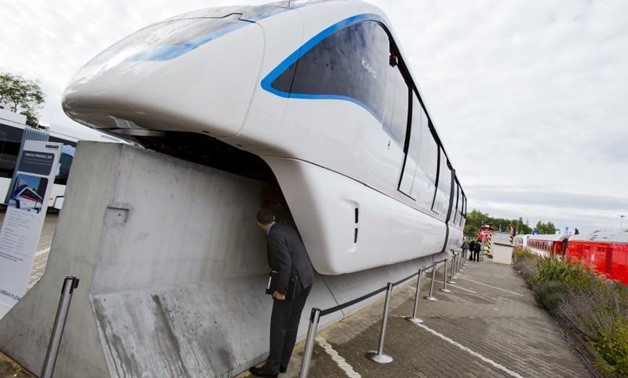
A man looks underneath an Innovia Monorail 300 train by Bombardier Transportation at the InnoTrans railway technology trade fair in Berlin - REUTERS
CAIRO - 2 December 2024: Egypt has achieved significant progress in the transportation sector in recent years, implementing national projects aimed at developing infrastructure and modernizing transportation systems. These efforts have led to substantial improvements in daily life for citizens and have contributed to driving economic growth across the country.
Egypt’s road and bridge network has seen a massive transformation. The National Roads Project has added over 7,000 kilometers of new roads, creating a more extensive and efficient network. Additionally, older roads have been upgraded to enhance their efficiency, which has improved connectivity between governorates, reduced travel times, and supported regional development.
In the realm of public transport, the country has embraced intelligent solutions to meet growing mobility demands. The Light Rail Transit (LRT) system, for instance, was introduced as a modern transportation option linking Greater Cairo with emerging cities such as the New Administrative Capital and 10th of Ramadan City. This system provides a fast and eco-friendly alternative for commuters.
Meanwhile, the high-speed rail project is underway, connecting major hubs like Ain Sokhna, New Alamein City, and Luxor. With trains capable of reaching speeds of up to 250 kilometers per hour, this initiative represents a transformative step in the rail transport landscape, offering a modern, efficient, and sustainable travel solution.
Efforts to expand and upgrade Egypt’s metro system are also ongoing. The government has completed extensions to Line 3 and is advancing work on Line 4. Additionally, the introduction of advanced trains has enhanced operational efficiency and improved the overall experience for metro passengers.
The railway sector has also undergone significant modernization. This includes the acquisition of new carriages and locomotives and the digitalization of signaling systems to reduce accidents and improve operational efficiency. Key railway stations have been renovated to provide better services for travelers, ensuring safer and more comfortable journeys.
Looking ahead, Egypt remains committed to executing ambitious transportation projects. This includes the monorail system, which will connect East and West Cairo, and the continued expansion of the high-speed rail network to serve more regions. These initiatives align with the country’s vision of building a comprehensive infrastructure that not only supports economic growth but also offers citizens modern, reliable, and safe transportation options.
Egypt’s advancements in the transportation sector reinforce its position as a regional hub for transport and logistics, demonstrating a clear commitment to fostering development and improving quality of life for all its citizens.
Comments
Leave a Comment